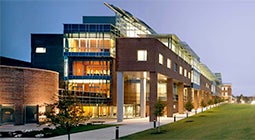Dr. Feng Guo: Intelligent Biomedical Systems for Precision Medicine
Wednesday, September 13th, at 11:00 am
This seminar will be both in person and via Webex
Location: Bruggeman
WebEx Link: https://rensselaer.webex.com/rensselaer/j.php?MTID=m2a8e6c012dbe0f53aa3bd244866c1795
Meeting Number (access code): 2623 372 7309 Password: yTWiPqaR626
Abstract: Biomedical devices, sensors, and systems have tremendously improved precision medicine by aiding in the diagnosis, monitoring, treatment, and management of various medical conditions. However, traditional medical approaches like microfluidic chips still rely on manual operation and post-test data analysis, leading to inaccuracies, low efficiency, and limited robustness in real-world settings. The integration of artificial intelligence (AI) could address these challenges, thanks to its ability to learn from data, make accurate predictions, and automate dynamic system control. As such, our group is dedicated to developing and integrating "Intelligent Biomedical Systems" by leveraging innovative device design, sensor fusion, and AI-guided system integration to interface with individual patients and patient-derived living materials (e.g., organoids). In this talk, I will introduce the development of ‘intelligent healthcare systems’ and ‘intelligent micro-physiological systems’ and showcase their translational applications in disease diagnosis, personalized therapy, and drug screening for cancers, neural disorders, and organoid engineering. By combining bioengineering technologies and AI, we hope to create innovative intelligent systems that are highly efficient, accurate, and convenient, ultimately revolutionizing precision and translational medicine.
Biography: Dr. Feng Guo is an Associate Professor of Intelligent Systems Engineering at Indiana University (IU) Bloomington. Before joining IU Bloomington in 2017, he received his Ph.D. in Engineering Science and Mechanics at Penn State and his postdoc training at Stanford University School of Medicine. His group is developing intelligent medical devices, sensors, and systems to address the challenges in translational medicine with the support of multiple NIH and NSF awards. He is a recipient of the NIH Director's New Innovator Award, the Outstanding Junior Faculty Award at IU, the Dean Postdoctoral Fellowship at Stanford School of Medicine, etc.
